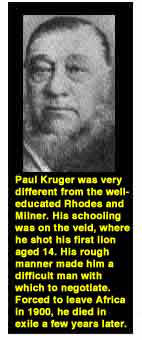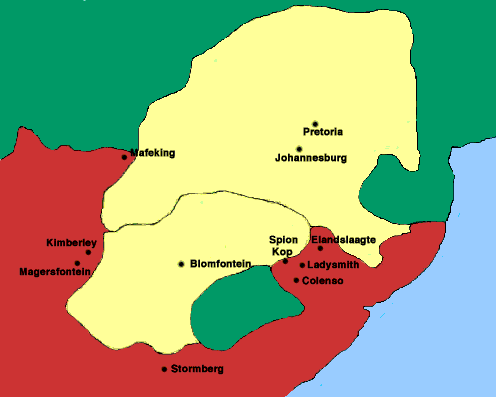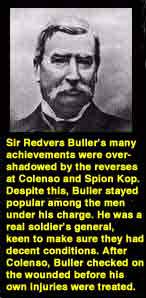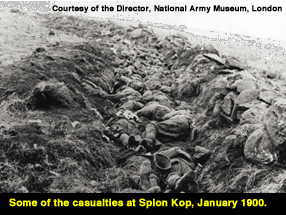The Gibraltar of the South
 The seeds of the Boer War had been sown over many years of tension between the British and Boers, descendants of Dutch immigrants. Britain had taken control of South Africa from the Dutch in 1806, prompting the fiercely proud Boers to move north and set up the Orange and Transvaal republics. During the Zulu Wars they accepted British protection but the tension between the governments lead to a first war in 1881. The defeat at Majuba Hill lead Prime Minister Gladstone to grant suzerainty to the two Boer states, meaning they now had some autonomy but were still ruled from Capetown. Gladstone was willing to concede very little due to the ‘Gibraltar of the South’s’ strategic importance in relation to trade routes. The settlement failed to dissipate the ill feeling between the sides, and the discovery of gold in these territories five years later increased the tension. The Boer president Paul Kruger was suspicious of the predominantly British outsiders (Uitlanders) who flocked in to his homeland to become rich. He believed that making concessions to the Uitlanders, whose number had grown to match the Boers, would lead to his people losing control of the mines, and eventually the whole state. Heavy taxes were imposed on the Uitlanders, and they were denied the opportunity to vote.
The seeds of the Boer War had been sown over many years of tension between the British and Boers, descendants of Dutch immigrants. Britain had taken control of South Africa from the Dutch in 1806, prompting the fiercely proud Boers to move north and set up the Orange and Transvaal republics. During the Zulu Wars they accepted British protection but the tension between the governments lead to a first war in 1881. The defeat at Majuba Hill lead Prime Minister Gladstone to grant suzerainty to the two Boer states, meaning they now had some autonomy but were still ruled from Capetown. Gladstone was willing to concede very little due to the ‘Gibraltar of the South’s’ strategic importance in relation to trade routes. The settlement failed to dissipate the ill feeling between the sides, and the discovery of gold in these territories five years later increased the tension. The Boer president Paul Kruger was suspicious of the predominantly British outsiders (Uitlanders) who flocked in to his homeland to become rich. He believed that making concessions to the Uitlanders, whose number had grown to match the Boers, would lead to his people losing control of the mines, and eventually the whole state. Heavy taxes were imposed on the Uitlanders, and they were denied the opportunity to vote.
The Jameson Raid
The behaviour of the notorious ‘goldbug’ and Prime Minister of the Cape parliament Cecil Rhodes was all the evidence Kruger required. Rhodes’ first attempt to take control of the Boer states and their riches came in the Jameson Raid in 1895, an attempt by Dr L.S. Jameson to spark an Uitlander uprising. Jameson assembled an armed force to back the Uitlanders with Rhodes’ full knowledge and approval. Success depended on the Uitlanders willingness to revolt, but when this was not forthcoming, Jameson launched the raid anyway. They were soon caught and deported to Britain to stand trial. Jan Smuts, a future Boer hero, claimed later that the war did not begin in 1899, but at the very moment Jameson rode across the border.
War
After Jameson, anti-British feeling grew and Kruger was re-elected in a stronger position than ever. The British Colonial Secretary, Joseph Chamberlain, appointed Sir Alfred Milner to try to manage the situation in South Africa. Milner believed that the muddled Raid had left war as the only option, and the longer Britain delayed, the stronger the Boer army would become. Post-Jameson, the Boers had embarked on a programme of mass armament while British troops arrived to reinforce the borders at Cape Colony and Natal. Milner used the denial of Uitlander and black Africans’ rights to stoke the Jingo spirit back home, culminating in a speech, chronicling the spectacle of thousands of British “helots” – slaves to the Boer government – being denied their rights, and therefore undermining the influence and reputation of Great Britain in the eyes of the world. This left Chamberlain in a difficult situation: Milner’s speech had been a deliberate to move the two countries nearer to war, and to back down was unthinkable. A conference was set up at Blomfontein in one final attempt to negotiate a settlement. Kruger put forward a motion that was little more than an ultimatum: the Transvaal franchise was the exclusive concern of the Transvaal government, and if Britain did not remove all troops from the borders, the Boers would regard this refusal as an act of war.
Early Reverses
 Organising and sending a force to Africa was a lengthy process. Aside from Italy, Britain had the smallest population of the Great Powers and maintaining control of a huge Empire stretched the military to the limit. The Boers took advantage, invading Natal and laying siege to Ladysmith, Kimberley, and the town of Mafeking in the Orange Free State. Once the troops began to arrive in Africa, from Britain, Canada, New Zealand and Australia, the first few months of the campaign were confined to attempts to relieve Ladysmith and Kimberley. These were disasters for the British commander Sir Redvers Buller. From December 11 to 16 ‘Black Week’ shocked the people of Britain expecting some news of easy victories. General Gatacre was defeated at Stormberg, Lord Methuen suffered a similar humiliating result at Magersfontein and most surprising of all, Buller himself was forced to retreat at the Battle of Colenso. The generals’ only experience of battle over the last decades had been clashes with natives in Africa and India. These were usually short, bloody affairs, victory determined by whichever side had the greater numbers. They had no first-hand experience of a drawn-out, tactics-lead war, and the Boers, with their superior field-craft, outmanoeuvred them at every turn.
Organising and sending a force to Africa was a lengthy process. Aside from Italy, Britain had the smallest population of the Great Powers and maintaining control of a huge Empire stretched the military to the limit. The Boers took advantage, invading Natal and laying siege to Ladysmith, Kimberley, and the town of Mafeking in the Orange Free State. Once the troops began to arrive in Africa, from Britain, Canada, New Zealand and Australia, the first few months of the campaign were confined to attempts to relieve Ladysmith and Kimberley. These were disasters for the British commander Sir Redvers Buller. From December 11 to 16 ‘Black Week’ shocked the people of Britain expecting some news of easy victories. General Gatacre was defeated at Stormberg, Lord Methuen suffered a similar humiliating result at Magersfontein and most surprising of all, Buller himself was forced to retreat at the Battle of Colenso. The generals’ only experience of battle over the last decades had been clashes with natives in Africa and India. These were usually short, bloody affairs, victory determined by whichever side had the greater numbers. They had no first-hand experience of a drawn-out, tactics-lead war, and the Boers, with their superior field-craft, outmanoeuvred them at every turn.
Following ‘Black Week’ and Buller’s increasing unreliability, the government were worried enough to replace him. Lord Roberts took overall charge and the hero of Khartoum, Kitchener, became his second in command. Thousands of extra men fired with patriotic duty after Black Week enlisted and were sent out within weeks. As Roberts was establishing his command in Capetown, the chastened Buller attempted to win back his reputation by forcing his way through to Ladysmith via a different route. The attacks on Spion Kop and Vaal Kranz in early 1900 resulted in plenty deaths and no success. On both occasions he won an initial advantage but lost his nerve in the face of a growing casualty list, ordering his men to withdraw when a bolder leader would have carried on.
The Tide Turns
 On the journey to Africa, Roberts had formulated the tactics to change the course of the war. Under Buller the army columns had been slowed down by the supply wagons that travelled with them. Taking his lead from the Boer model, the men were to carry their own rations, enough for two days only. This greater mobility, allied to the arrival of the reinforcements from home enabled some progress to be made at last. In his first month Kimberley was relieved and the Orange Free State capital of Blomfontein was captured. Even Buller had finally managed to get through to Ladysmith, where he received a belated hero’s welcome.
On the journey to Africa, Roberts had formulated the tactics to change the course of the war. Under Buller the army columns had been slowed down by the supply wagons that travelled with them. Taking his lead from the Boer model, the men were to carry their own rations, enough for two days only. This greater mobility, allied to the arrival of the reinforcements from home enabled some progress to be made at last. In his first month Kimberley was relieved and the Orange Free State capital of Blomfontein was captured. Even Buller had finally managed to get through to Ladysmith, where he received a belated hero’s welcome.
A typhoid epidemic among the troops in Blomfontein, held up the advance for two months. The cut in rationing had increased mobility, but left many weakened and susceptible to diseases. Eventually the British forces gathered to invade the Transvaal. The two major cities, Johannesburg and Pretoria, were under British rule by June, and on 1 September Roberts formally annexed the Transvaal. The remaining Boer forces had retreated to the outer reaches of the state and Kruger fled to Europe. As far as Roberts was concerned the war had been won at this point and he returned home, leaving the less inspired, more methodical Kitchener in charge.
 However, the Boers had not surrendered yet. Many burghers who had surrendered and returned to their farms were inspired to rejoin the commandos under the intelligent leadership of younger Boer leaders such as the De Wet brothers, De La Rey and Jan Smuts. The conflict turned into a drawn out guerrilla war. The Boers would raid isolated supply routes and bases, disappearing before the British troops could rally. In an attempt to discourage burghers taking up arms once again, Roberts had issued an edict that anyone found harbouring armed burghers would have their property burned to the ground. This draconian method of intimidating the Boers into giving up had the opposite effect, causing bitter resentment among the Boers. Kitchener’s solution to this new kind of war was to systematically fence off vast areas to restrict the guerillas’ movements and then conduct huge drives by solid masses of troops so that the Boers in front of the advancing army would be swept into the net. This was a laborious process but had some measure of success. A first attempt to negotiate peace at Middleburg floundered on compensation terms.
However, the Boers had not surrendered yet. Many burghers who had surrendered and returned to their farms were inspired to rejoin the commandos under the intelligent leadership of younger Boer leaders such as the De Wet brothers, De La Rey and Jan Smuts. The conflict turned into a drawn out guerrilla war. The Boers would raid isolated supply routes and bases, disappearing before the British troops could rally. In an attempt to discourage burghers taking up arms once again, Roberts had issued an edict that anyone found harbouring armed burghers would have their property burned to the ground. This draconian method of intimidating the Boers into giving up had the opposite effect, causing bitter resentment among the Boers. Kitchener’s solution to this new kind of war was to systematically fence off vast areas to restrict the guerillas’ movements and then conduct huge drives by solid masses of troops so that the Boers in front of the advancing army would be swept into the net. This was a laborious process but had some measure of success. A first attempt to negotiate peace at Middleburg floundered on compensation terms.
The scorched earth policy had created additional problems for Kitchener, now left in charge of thousands of homeless women, children and elderly. His solution was to round them up and install them in concentration camps. The humanitarian motives behind the camps were impeccable, but the lack of adequate resources to cater for the huge influx of refugees left the camps at the mercy of epidemics and thousands died. By this point Britain’s involvement in the war had become an embarrassment. The exploits of Smuts and De Wet had made them into folk-heroes all over the world at the expense of Britain’s reputation. The horror stories from the concentration camps had turned public opinion against the campaign, and it became important for all involved to reach a settlement as soon as possible.
Peace
In the early weeks of 1902, the government authorised Kitchener and Milner to listen favourably to any peace overtures from the Boers. Negotiations began in April between Milner, Kitchener and Kruger’s successor, Louis Botha, at Vereeniging. The Boers initial insistence on independence was unrealistic, and Milner refused to even consider it. Kitchener was desperate to get back to India and at a delicate point in the negotiations, he took Smuts to one side, and explained that in his opinion the Liberal Party would win the next election back home and if the Boers compromised with Britain now, they would eventually be granted a constitution for South Africa. A treaty was signed at Vereeniging on May 31. The Boers received £3m compensation to rebuild the country, guarantees that their culture would be retained and autonomy as soon as circumstances permitted. Most controversially, the British agreed not to pursue the thorny problem of rights for Natives at this point. In return the Boers recognised King Edward VII as their sovereign. For such a bloody war, there was little ill-feeling between the rival states and by 1910, eight years to the day from the peace treaty, the Union of South Africa was formed, an important member of the Commonwealth. During the First World war, many of those that had fought on opposing sides a few years previously were united in the war effort.
Links:
The Anglo-Boer War Museum, South Africa
Recommended reading:
The Boer War, Edgar Holt, 1958
The South African War: the Anglo-Boer War 1899-1902, Ed. Peter Warwick, 1980
The Boer War, Thomas Pakenham, 1979
The Great Boer War, Byron Farwell, 1976